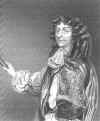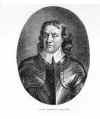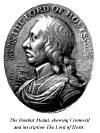|
The
Battle of Dunbar, 3 September 1650.
 Led Led
by David Leslie, nephew of Alexander Leslie, Lord Leven,
the Covenanter Army had been actively engaged in
suppressing odd outbreaks of royalist risings in
Stirling, Inverness and Atholl. In March 1650
the Marquis of Montrose had landed in Orkney and had been
beaten arrested and executed (21 May). These successes and
the return of Charles II in June gave the Covenanters a
sense of invincibility – the Lord was with them.
Such was there belief that the zealots among them demanded
the removal of `malignants` from the Army. Numbers vary
with source but about 3,000 officers and men – many of
them seasoned campaigners, were dismissed from the
army assembled to face the English invasion under
Cromwell. About 16,000 foot and 7,000 horse were mustered.
As a
precursor to battle Leslie had ordered the land in front
of the English army to be stripped of all that might help
them, crops, grain , animals and fodder were removed
or destroyed. The ramparts of Leith and Edinburgh
were also strengthened and Cromwell`s army
was forced to approach over rough country. Recognising the
strength of the Scots` position, Cromwell tried get them
into an early action with June and July taken up by
fruitless marches to Linlithgow , Glasgow and back, The
young General Lambert, meanwhile had moved across the
Forth and dealt a deadly blow at Inverkeithing. Despite
these challenges Leslie held back throughout July and
August and Cromwell was forced to withdraw towards Dunbar
where he might rest and re supply his remaining 11,000
men. By this time his supplies were very short, there was
camp fever and dysentery among his troops – and withdrawal
to England looked very attractive. Confined to the
headland of Dunbar Cromwell wrote to General Haselrigg at
Newcastle for a relief column to come to his aid
”
We are upon an engagement
very difficult. The enemy has blocked up our way at
the Pass of Copperspath, through which we cannot get
without a miracle. He lieth so upon the Hills that we know
not how to come that way without great difficulty; and our
lying here daily consumeth our men who fall sick beyond
imagination”.
Meanwhile,
ensconced on Doon Hill, Leslie and his force were in a
strong position and for all practical purposes had won the
campaign. It was then the zealous ministers of the
Kirk, especially members of the General Assembly, followed
up on their earlier purge of the army by demanding that
Leslie move forward off of the hill. Leaving the
sanctuary of the heights was bad enough but the night of
2-3 September was very wet and windy resulting in many raw
officers leaving their troops to seek shelter in
buildings nearby. The infantry was told to
extinguish their matches, and a reduced number of scouts
were sent out. Worse was to follow as the quality of the
scouts was far from good, some having reported the hearsay
that Cromwell had shipped his guns. On Monday 2nd
September, towards the evening Cromwell saw movement of
the Scottish Horse and guns that came down and moved
towards Berwick which would cut off a retreat south.
Cromwell is reputed to have said of the unexpected good
fortune
“The
Lord hath delivered them into our hands.”
A master
tactician, Cromwell noted that the Scots had descended
into a burn which restricted their deployment and
bottled up the cavalry on that wing. He immediately
ordered his guns (allegedly put on ship) to be moved
under cover of night so that he could attack the Scots in
the burn. He then deployed his regiments laterally to make
a pre dawn attack that swept through the Scottish lines.
Taken by surprise the

Scots were defeated almost within minutes, with 4,000
killed and 10,0000 prisoners – only some 4,000,mostly
cavalry, escaped. Also taken were some two hundred
standards and thirty guns. There were a few spirited
rallies by the Scots, in particular by soldiers under the
command of Campbell of Lawers, but the professionalism and
sheer determination, perhaps desperation, of Cromwell`s
forces overcame them. A pursuit followed which Cromwell
stopped while they sang the 117th Psalm and rested the
horses, and then sent the cavalry on to do their bloody
work.
Cromwell
wrote the Scots were ” made as by
 the the
Lord of Hosts as stubble to their swords.” Within days his
army had captured Edinburgh and Leith, although Edinburgh
Castle held out. Aware also of the politics that
surrounded him at this time, Cromwell wrote again to
Haselrigg in prophetic vein:
“Surely
it is probable the Kirk has done their do. I believe their
King will set upon his own score now; wherein he will find
many friends.”
So it was,
with the Resolutioners (the moderate party) gaining
control and Charles himself taking a more active role in
preparing a dash south into England where he hoped to find
support. It was in fact to lead to another decisive defeat
for the royalists at Worcester
exactly one year later – 3rd September 1651.
|